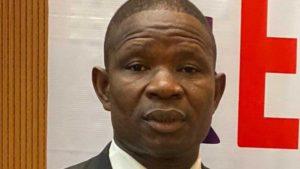There is anxiety among Nigerians over the looming increase in the price of premium motor spirit (petrol) as the price of crude oil surged to $61 per barrel at the international market last week. The possible price hike is expected to also affect other petroleum products such as diesel and kerosene.
Since the full deregulation of the down stream sector of the petroleum industry (which concerns the supply and marketing of petroleum products) by the Federal Government in March 2020, the pump price of petrol, diesel and kerosene in the country have been determined by prevailing market forces mainly based on the international market price of crude oil. This means that when the price of crude oil falls at the international market, the price of petrol accordingly comes down at the local market and whenever crude oil price rises, the price of petrol goes up.

Following the latest rise in the international market price of crude oil, both the minister of state for petroleum resources, Chief Timipre Silver and the Group Managing Director of the Nigerian National Petroleum Corporation (NNPC), Mallam Mele Kyari had warned the nation to brace up for a possible rise in the pump price of petrol in line with the deregulation regime in operation.
However, the prospect of a further hike in the price of petrol did not go down well with the organized Labour sector which has been threatening to mobilize Nigerians against its acceptance arguing that a pump price increase in the present circumstances would impose more hardship on the people who are already struggling with the effects of a sluggish economy.Advertisement
Although the organized Labour sector represented by the Nigeria Labour Congress (NLC) and the Trade Union Congress (TUC) have not renounced their support for the deregulation policy on which they were duly consulted by government before its introduction, they appear not comfortable with the movement of market forces which now rule the industry.
At the time the deregulation policy came into effect , the price of oil at the international market was very low partly due to the global effects of the Covid-19 pandemic.. The policy seemed to be a relief and tolerable especially when the price of crude oil further came down not long after its introduction and the pump price of petrol was accordingly adjusted downwards.
The deregulation policy was indeed a solution for both the government and the civil society. On one hand, the policy put an end to the payment of subsidy by government to marketers which had become largely unsustainable as a result of dwindling resources available to government. On the other hand, it allayed concerns in the civil society over corruption related allegations in the management of the subsidy regime.
However, the real test of the policy came as the price of crude oil began to rebound in the second half of last year, it became inevitable for the pump price of petrol in the country to rise accordingly but this has met stiff resistance from the labour unions who have continued to express concerns on the unpleasant multiplier effects of fuel price hike on the welfare of the masses of Nigerians in an economy that was struggling to get back on its feet since the socio-economic lockdown forced on the nation by the Covid-19 pandemic for most part of last year.

The situation now is that the price of crude oil at the international market has continued to rise steadily. Ordinarily this development should be good news for Nigerians because it means more revenue would accrue to the country (which is heavily dependent on crude oil sales) to provide infrastructure and social amenities for the welfare of its citizens. Unfortunately, this encouraging news has not generated enthusiasm from Nigerians because of the fear that it also means a steady rise in the pump price of petroleum products in the country as they are now dependent on global market forces.
Faced with this situation, the Federal Government had to intervene in September last year to negotiate and fix the pump price of petrol at between N162 and N165. A further intervention became necessary when the price of crude oil rose again in November 2020. After negotiations with critical stakeholders, the government fixed the pump price of petrol at between N170 and N175. This time around, government was forced to reintroduce some measure of subsidy to cushion the impact of the hike in the price of crude oil so that Nigerians won’t have to bear the burden alone.
Now that the price of crude oil has risen to $61 per barrel, it is inevitable that the pump price of petroleum products will rise again in the country. There are speculations that the pump price of petrol may rise to as high as N195 per litre. That has not been determined yet but the Federal Government has again engaged stakeholders on how to arrive at a reasonable and sustainable pump price regime in the present circumstance.
It appears that government may not be able to go beyond the present level of subsidy intervention because of competing demands for attention from other critical sectors. In fact there is no provision in the 2021 Appropriation Act (Budget) for subsidy payment. That is why it is necessary for the organized Labour and the civil society to engage the government with understanding to find a reasonable and tolerable pump price.
It is worthy of note that the deregulation policy has largely stabilized petroleum products supply in the country over the past year. It was meant to eradicate the distortions in the local market which had been responsible for incessant fuel scarcity and lack of investment in the downstream sector. It has substantially achieved that objective.
As equally envisaged, the liberalization effect of the policy was supposed to generate competition among marketers to source products from anywhere and sell at competitive market prices. That would have helped to force down pump prices to the benefit of consumers but the scarcity of foreign exchange has made it difficult for the marketers to import products thereby making the NNPC the sole importer in keeping with its statutory mandate as the marketer of last resort. The NNPC has painfully but perseveringly bore this burden which in the long run might negatively affect its profitability as a commercial entity.
Some stakeholders have argued that if the local refineries were in operation, the price of petroleum products would be lower than what the deregulation regime offers. But if the local refineries are revamped and they also operate under the ambience of deregulation, they would buy crude oil at the international market price which has been the policy of government since 2004. Their operation would only result in marginal decrease in the pump price since the only cost element local refining would bring down is the freight cost.
It is therefore imperative for Labour leaders and the civil society to understand that the deregulation of the downstream sector is still the best bet to prevent fuel scarcity and the consequent outrageous hike of prices when consumers have to buy in desperation from few available sources or even the black market. It is not in the interest of anybody to contemplate going back to those harrowing times.
In many developed and developing countries with strong or stable economies, it is an acceptable norm for prices of commodities determined by market forces to go up or down as the case may be. The real current problem with deregulation of of price of petroleum products in Nigeria is our depressed economy resulting in the weakness of our national currency, the Naira to the US Dollar which is the international currency by which crude oil price is determined at the international market.
If Labour leaders care to investigate the range of prices of various imported consumer products in recent times, they would find that prices have been on the increase, sometimes by more than 50 per cent at a time and sometimes they come down again as the naira weakens or stengthens against the dollar.
Nigerians will not reject an increase in the international market price of crude oil. Let all stakeholders including Labour join hands with the government to ameliorate its effect on the local economy while we hope that the economy will grow and strengthen to compete favourably at the international market.

















